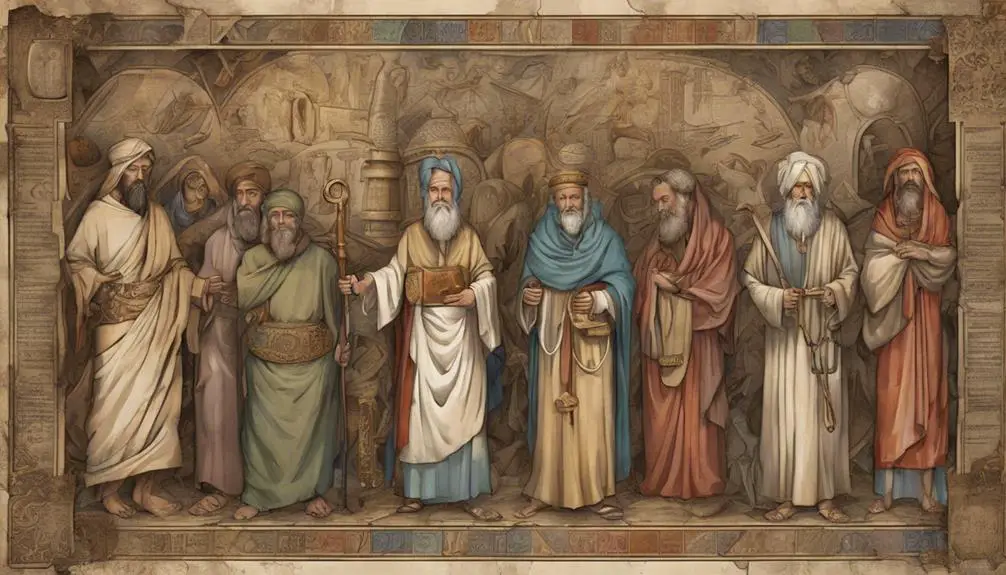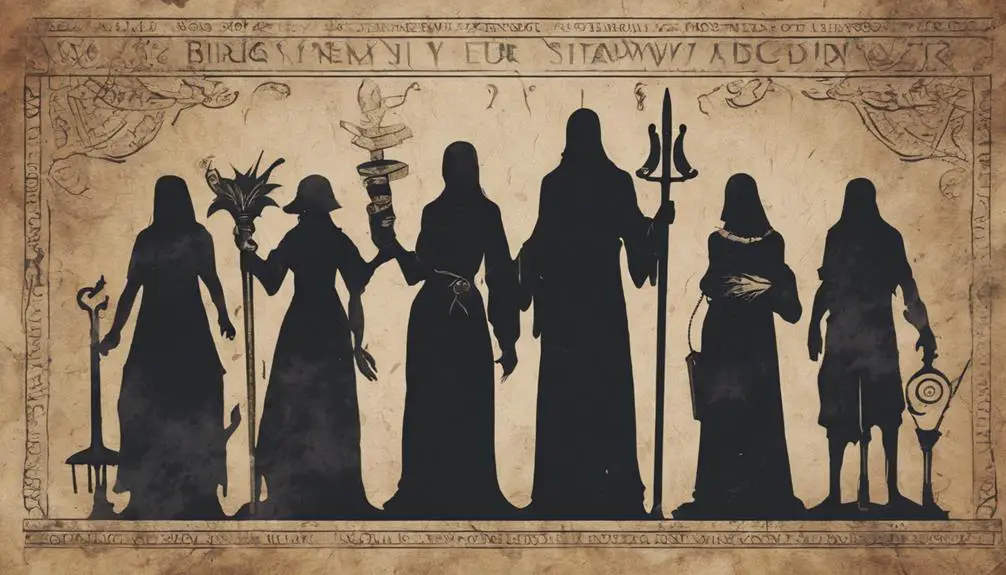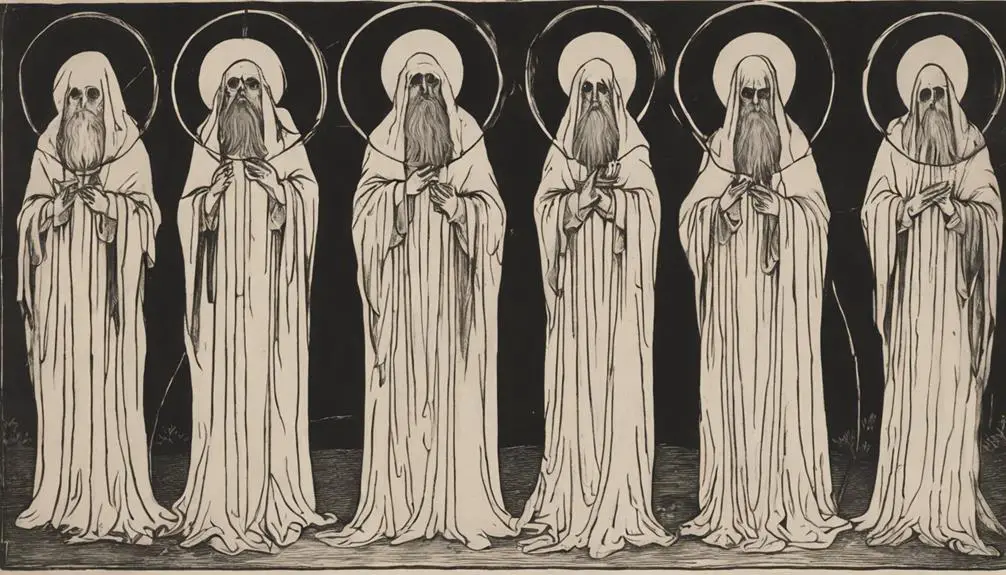Scrutinizing the 'Seven Woes' in the Bible can offer enlightening insights into the realm of genuine righteousness and spiritual self-examination.

Seven Woes in the Bible
You might not be aware that the 'Seven Woes' in the Bible, specifically in the book of Matthew, were actually dire warnings issued by Jesus to the religious hypocrites of His time. These warnings, deeply layered and rich in meaning, serve as a mirror for self-examination and a guide to genuine righteousness.
What could it mean for your spiritual journey to reflect on these woes? Let's explore together, and perhaps you'll find a new perspective on this less-discussed biblical narrative.
Key Takeaways
- The 'Seven Woes' in the Bible are Jesus's admonishment of religious leaders for their hypocrisy and spiritual blindness.
- These 'woes' symbolize regret, disaster, and are a call for repentance and self-reflection.
- 'Woes' are used as divine warnings, indicating the severe consequences of ignoring God's laws.
- Understanding 'woes' in the Bible can guide individuals to uphold Christian morality, maintain integrity, and prioritize spiritual wealth over material possessions.
Understanding Biblical Context of Woes

In grasping the biblical context of 'woes', you'll need to delve into the intricate layers of ancient prophecies, narratives, and expressions, shedding light on the implications and significance of this term in Holy Scripture. The term 'woes' prominently surfaces in prophetic literature; it's an exclamation of grief, distress, or lamentation. A careful examination of the 'woes symbolism' reveals how it's often used to signify impending doom or judgment, often evoking a sense of urgency and a call for repentance.
The 'woes historical interpretation' offers a deeper understanding. It's not just a mere expression of despair, but a prophetic tool used by prophets like Isaiah, Ezekiel, and Habakkuk to warn their contemporaries of the impending divine judgment due to their misdeeds. It's a stark reminder of the consequences of disobedience and rebellion against divine ordinances.
Understanding the 'woes' in the Bible, therefore, necessitates a thorough understanding of these historical and symbolic contexts. This comprehension paves the way for a richer, more nuanced grasp of the biblical text, allowing you to appreciate the depth and complexity of the divine-human interaction encapsulated in these ancient prophecies and narratives.
Exploring the Seven Woes

Now, let's turn our attention to the 'Seven Woes', a distinct and critical portion of biblical woes, to further enhance your understanding of this concept. These woes, found in Matthew 23:13-32, are a series of denunciations made by Jesus against the scribes and Pharisees, highlighting their hypocrisy and spiritual blindness.
Woe symbolism, as seen in these instances, communicates a profound sense of regret and disaster. Here's a brief rundown:
- Woe to you, teachers of the law and Pharisees, you hypocrites! You shut the door of the kingdom of heaven in people's faces.
- Woe to you, scribes and Pharisees, hypocrites! For you travel land and sea to win one proselyte, and when he's won, you make him twice as much a son of hell as yourselves.
- Woe to you, blind guides, who say, ‘Whoever swears by the temple, it's nothing; but whoever swears by the gold of the temple, he's obliged to perform it.'
- Woe to you, scribes and Pharisees, hypocrites! For you cleanse the outside of the cup and dish, but inside they're full of extortion and self-indulgence.
Indeed, in the context of these woes in prophecy, they serve as a stern warning and a call to repentance.
Woes and Their Significance

Delving into the significance of biblical woes, you'll find that they serve not merely as expressions of despair, but also as powerful tools for conveying divine messages of warning and the urgent need for repentance. In original Hebrew texts, 'woe' translates to 'hoi', a term often used to attract attention to the dire consequences of ignoring God's laws. These woe definitions demonstrate the depth of meaning behind each pronouncement.
Contrastingly, woes in other religions carry different connotations. In Buddhism, for example, 'woe' refers to the three states of suffering in the wheel of life: the world of animals, hungry ghosts, and hell-beings. Here, the term is used to represent enduring pain and suffering.
Thus, the significance of woes is multifaceted, serving as an indictment, a lament, and a warning. They're a potent manifestation of divine disapproval, meant to awaken the conscience of the sinful and lead them towards the path of righteousness. Their use in the Bible, therefore, is an indicator of the gravity of the transgressions committed, and the severity of the punishment that awaits if repentance isn't sought.
Contemporary Lessons From Woes

While the biblical concept of 'woe' holds profound historical and religious significance, it's crucial to understand the contemporary lessons we can draw from these divine warnings. The woe implications are particularly relevant to our modern woes, offering us valuable insights.
- Modern Reality of Hypocrisy: Just as biblical woes were directed at hypocritical religious leaders, today's society experiences similar situations. We should strive for authenticity and consistency in our actions and words.
- Materialism: The woes warned against greed and materialism. Modern woes often revolve around an excessive desire for wealth and possessions, reminding us to focus on spiritual and moral wealth instead.
- Neglect of Justice: The biblical woes condemned the neglect of justice, a lesson that remains vital today. We must ensure that justice is upheld in our societies.
- Misplaced Priorities: Lastly, the woes urged refocusing on spiritual matters over trivialities. Our modern woes can often stem from misplaced priorities, emphasizing the need for balanced focus.
In essence, the biblical concept of 'woe' still offers relevant lessons for contemporary society. By understanding these, we can navigate our modern woes more effectively, achieving a society that aligns more closely with these time-honored values.
Woes and Christian Morality

In the realm of Christian morality, the concept of 'woe' plays a pivotal role, serving as a stark reminder of the consequences of straying from ethical and spiritual principles. Woe interpretations can provide you with valuable insights into the nature of personal accountability, a cornerstone of Christian morality.
Consider the following table, which presents three possible interpretations of 'woes':
Woe |
Description |
Interpretation |
|---|---|---|
Woe as punishment |
Consequence of violating God's commandments |
A call to personal accountability |
Woe as regret |
Emotional suffering due to personal failings |
A reminder to uphold Christian morality |
Woe as prophetic warning |
God's forewarning of impending disaster |
A call to repentance and moral realignment |
Woe as sorrow |
Deep grief for sinful actions |
An invitation to seek God's forgiveness |
Woe as a plea |
Urgent appeal to God for mercy |
An encouragement to turn back to God |
These interpretations aren't just abstract theological concepts; they're practical guides for your moral journey. As you navigate life's challenges, remember that the 'woes' serve as poignant reminders of the need to uphold Christian morality and personal accountability.
Frequently Asked Questions
What Are Some Other Notable Woes Mentioned Outside of the Seven in the Bible?
You're asking about woes outside of the seven mentioned in the Bible. Well, the Bible's full of woe symbolism. In the book of Revelation, you've got the three woes—dreadful events symbolizing God's final judgment. Each woe has different implications, like a warning or a consequence for actions.
How Have Different Denominations of Christianity Interpreted the Seven Woes?
Different Christian denominations interpret the 'Seven Woes' uniquely, reflecting their theological perspectives. These interpretations often hinge on denominational differences.
For instance, Catholics may view them as a call to personal penance, while Protestants might see them as a critique of religious hypocrisy. It's fascinating how these varied interpretations reflect the distinctive beliefs and practices within each denomination.
Are There Any Similar Concepts to the Seven Woes in Other Religious Texts?
Yes, similar concepts to the 'Seven Woes' exist in other religions. In Buddhism, there's the 'Eight Sufferings', which outline various forms of human distress. Hinduism, too, has the 'Sixteen Sufferings', mirroring life's hardships.
Though they differ in number and specifics, these teachings share a common theme: acknowledging the inevitability of suffering as part of human existence. It's an interesting cross-religious exploration, isn't it?
How Has the Concept of 'Woes' Evolved in Theological Studies Over Time?
In theological studies, the concept of 'woes' has evolved significantly. Initially, 'woes' symbolized divine judgment or misfortune, often reflecting historical context.
Over time, scholars began to see 'woes' as a tool for moral instruction and social critique. You'll notice this shift in various religious texts where 'woes' are used to challenge injustice and promote ethical behavior.
How Has the Portrayal of Woes in Popular Culture Been Influenced by the Seven Woes in the Bible?
You've likely noticed how woes are depicted in films and literature. It's not just random.
The portrayal of woes in popular culture has been greatly influenced by the biblical woes.
These biblical references give depth and context, allowing creators to explore complex themes of morality, punishment, and redemption.
Conclusion
In the end, you've recognized the seven woes aren't simply ancient proclamations, but poignant reminders for today's living. They underscore the importance of sincerity, humility, and justice in Christian morality.
These woes challenge you to examine your own actions critically, ensuring they align with Christ's teachings. Remember, it's not about outward appearances, but the heart's true condition.
By understanding and applying these lessons, you're taking crucial steps towards a more authentic Christian life.



Sign up